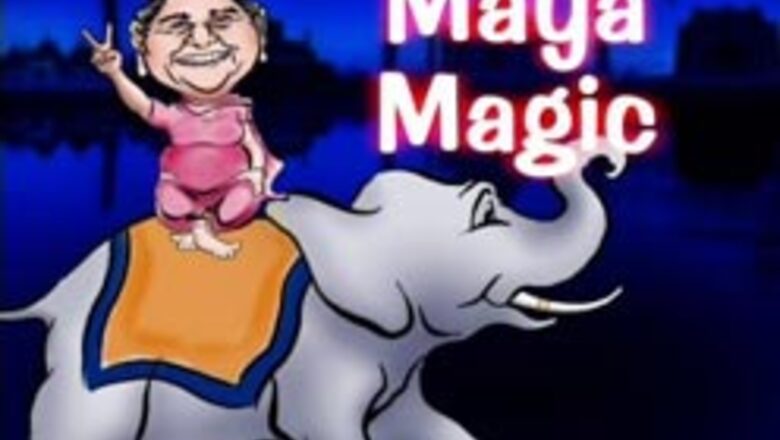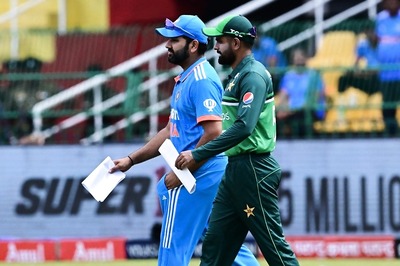
views
New Delhi: On May 11, 2007, a Dalit ki beti became the first politician to win an election on her own team.
Mayawati has spread her maya jaal and is all set to become the next chief minister of India’s most populous state.
And not only in UP, with 15 crucial seats in Lok Sabha and gained power from the Assembly elections, her say in national politics has also increased; so much so that she now virtually holds the key of next Presidential elections.
With a decisive verdict, Mayawati has made it clear that he has development in her agenda and not just punishing the SP leaders, though she has already announced an investigation against the Parliamentary Affair Minister of the outgoing government Azam Khan after it was found that his officers were burning official files and papers.
“Mulayam has already conceded defeat. Marey huey aadmi ko kya marna hai (What is the point in killing a dead person)? The people have already punished him,” said Mayawati.
While celebrations were there in the Mayawati camp, the SP headquarter had a desolate look. Mulayam admitted that he failed to read the mood of the public and only at 1500 hrs IST on Friday, he went to submit his resignation.
Mulayam has lost his toughest battle and blamed the Election Commission for his defeat after submitting his resignation to the Governor.
Meanwhile people of Badalpur, Mayawati’s own village, are elated and they are expecting roads to be built and electricity to comeback to the area. In fact, soon after it has become clear that Mayawati is going to form the next government, electricity has been restored in the village.
“We are extremely happy. The news of Mayawati becoming the chief minister is not only a good news for Badalpur, but also for the whole state,” said one villager.
Moreover the villagers not only want development for Badalpur, but also overall development of entire UP.
And for the national parties – the Congress and the BJP, it’s a complete wipe out.
For the Congress, Rahul Gandhi’s first political test gets thumbs down from the voters, with the party doesn’t even manage to hold on to its 25 seats.
However, on the issue of “complete wipe out of national parties”, Abhishek Manu Sinhvi of Congress said, though the party is not very satisfied or upset with its performance, the word “wipe out” is more appropriate for the BJP and “lack of improvement” or “not enough improvement” is applicable to the Congress as in comparison to last performance, the part has gone down by only four seats.
Describing the Congress’s expectation to get at least double the current figure, Singvi said the party is “definitely disappointed”. Despite the huge public interest and gathering, which raised the expectation, the interest didn’t convert into vote as “people rightly realised that it will be futile to caste a vote (for Congress) because it will not get them majority for a party,” said Singhvi.
Singvi, however, acknowledged that the social engineering done by Mayawati – in line of the Congress’s “rainbow of coalition” – has worked “brilliantly this time”.
PAGE_BREAK
Before the counting of vote, everyone was apprehending that the real battle or the real thriller would begin after the results are out.
So, CNN-IBN National Affairs Editor Diptosh Majumdar termed the result as “anti-climax” and said, “The battle is already over and there will be a new government within few days”.
“I think that is the most decisive aspect of UP,” he said, adding, anti-incumbency together with the caste factor resulted into such a huge verdict for a positive government.
Taking a general view, Singvi said emergence of a single party as majority party is “good thing” for UP, politics and sovereignty as there would be “greater aggregation, consolidation and perhaps better governance and stability”.
The BJP has admitted that it is an unprecedented verdict.
Ravi Shankar Prasad of BJP admitted that the results were a big disappointment for the BJP. But instead of terming it a “complete wipe out”, he justified the performance of the party by saying that the people of the state wanted a decisive change and out of the BJP and BSP as two alternatives, they saw BSP as more effective instrument.
Indicating the failure of exit polls, Prasad said that everybody has failed to read people’s mind and it is necessary to know people’s mood. They want change and find BSP more “effective instrument” to push out Mulayam from power.
Majumdar said that the BJP has capitalised the anti-incumbency in Punjab and Uttarakhand well. But to take advantage of the anti-incumbency in UP, there were three parties – the Congress, the BJP and the BSP. The Congress didn’t want to use it due to lack or organisatin and the BJP got confused whether to go Hindutva way or not. As a result the BSP came and filled the vacuum.
On the possibility of UP going to experience vendetta politics, Majumder said, “it could happen” that Mayawati going after Mulayam.
And on the possibility that Reliance in UP may suffer due to Anil Ambani’s close proximity with Mulayam, Majumdar said that Mayawati in her last three term has not “befriended the industry as such” and industrialists were afraid of Mayawati coming back to power.
Regarding the impact of UP elections on national politics, especially when the presidential election is around the corner, Sitaram Yechury of CPI-M said that UP elections are indeed significant and they would have an impact on national politics but not in the sense of “destabilizing” the Government at the Centre.
But for presidential elections, the BSP has gained about by 32,000 votes and likewise there will decline in the SP and BJP vote shares, informed Yechury.
On the possibility of having a Dalit President after Mayawati gained power and possibly a “decisive power”, Majumder said it is “quite possible”.
However, referring to this election’s slogan of Mayawati that yeh haathi nahi Ganesh hai, Yechury said, it is not necessary that victory of Mayawati means having only a Dalit President.


















Comments
0 comment